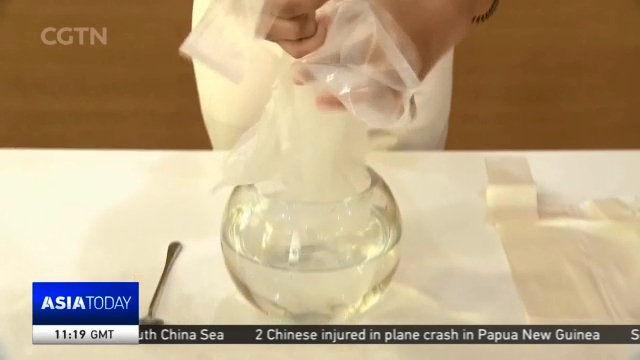
19:47, 28-Sep-2018
Pollution Solutions: Water soluble bags may reduce white pollution
Updated
19:05, 01-Oct-2018
02:42

Plastic pollution is now a major environmental problem worldwide. A Chinese company has proposed a solution: a grocery bag that does not use any plastic, and quickly dissolves in water. CGTN's Cui Hui'ao visited the company to find out more.
In less than a minute, this bag dissolves in cold water. It's a new solution that this company in Qingyuan city of Guangdong Province has come up to battle white pollution.
LYDIA LI, GENERAL MANGER POLYE MATERIALS "Three years ago we developed this water soluble bag after collaborating with a Guangzhou University. It's made of PVA, a controversial material because of its degradability. But its water solubility makes it a perfect material for bags, which will do little harm to the environment."
The company has showcased the new material bag at rubber and plastic exhibitions for years. Li says many clients abroad have expressed interest, yet cost remains a concern, as using such bags would double or even triple expenses for retailers. Nevertheless, a company in Chile has become a partner, mainly since all plastic bags are banned there.
LYDIA LI, GENERAL MANGER POLYE MATERIALS "It's an opportunity for us because they need an alternative to plastic bags. In fact, the challenge we face here is that China has not yet prohibited plastic bag usage, which makes it difficult for us to promote our product."
CUI HUI'AO QINGYUAN CITY, GUANGDONG PROVINCE "Ten years ago, China issued its first ban on the use of the thinnest types of plastic bags. It was seen as an attempt to ease environmental pressures that have come with rapid economic growth. A decade later, still, as many as 2 billion plastic bags a day are used in China, putting tremendous pressure on the country's resources."
The exponential growth of delivery and food take-out industries has contributed to the plastic bag issue. The filth is commonly found in waterways, on beaches, and in oceans.
PROF. HUANG MINGZHI ENVIRONMENTAL RESEARCH INSTITUTE, SOUTH CHINA NORMAL UNIVERSITY "According to our study, there are over 600 micro particles of plastic every milliliter in city rivers. There's about 8 million tons of plastic waste flowing into the sea every year, and the Pearl River contributes over 100 thousand tons."
Experts say by 2050 the world's oceans will have more plastic than fish by volume. This will pose a huge threat to marine life and human beings. Asked whether water soluble bags will be the dealbreaker, Li says at the end of the day, it still comes down to each citizen's environmental awareness. Cui Hui'ao, CGTN, Guangdong province.

SITEMAP
Copyright © 2018 CGTN. Beijing ICP prepared NO.16065310-3
Copyright © 2018 CGTN. Beijing ICP prepared NO.16065310-3